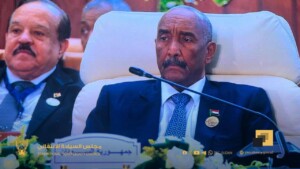Protestors temporarily reopen Khartoum-Port Sudan road
Protests against the eastern Sudan protocol in the Juba Peace Agreement continued in Port Sudan yesterday. The road to Khartoum was temporarily reopened. The escalating crisis in eastern Sudan dominated Tuesday’s Council of Ministers meeting.
 Khaled Idris, head of the United Popular Front for Freedom and Justice, and member of eastern Sudan track negotiation team (Social media)
Khaled Idris, head of the United Popular Front for Freedom and Justice, and member of eastern Sudan track negotiation team (Social media)
Protests against the eastern Sudan protocol in the Juba Peace Agreement continued in Port Sudan yesterday. The road to Khartoum was temporarily reopened. The escalating crisis in eastern Sudan dominated Tuesday’s Council of Ministers meeting.
Mohamed Karar, a leading member of the Beja Nazirs Council, told Radio Dabanga yesterday that the protestors opened the Khartoum-Port Sudan road for 48 hours as a gesture to the government.
He said that the protestors are still waiting for a response from the government to their demands. He threatened to block the road again if their demands are not met. Closing the road between Port Sudan and Khartoum means that no goods can be transported from the main port to the rest of the country. Sudan’s economy is already in crisis.
Cabinet meeting
The escalating crisis in eastern Sudan dominated yesterday’s cabinet meeting. The discussions focused on the situation in Port Sudan, the governance crisis in Kassala, the tensions in the region in general, and the role of the security forces in eastern Sudan.
Minister of Information and Culture, and spokesperson for the government Feisal Mohamed Saleh reported after the meeting that the ministers “agreed on the need for an integrated strategy to manage the eastern Sudan crisis, because of its many complications, and the various security and international dimensions”.
The crisis “requires training in holding dialogues, and development programmes,” he said. “The increasingly racist discourse among the various Beja clans must be addressed, and a culture of peace must be spread.”
Security and Defence Council
Sudan’s Security and Defence Council acknowledged in an emergency meeting about eastern Sudan yesterday that “the region suffers from deep-rooted problems”, and that “the solution should be different from the way the problem was treated so far”.
The meeting was presided over by the president of the Sovereign Council, Lt Gen Abdelafattah El Burhan. The Council decided to form a committee headed by Sovereign Council member Lt Gen Ibrahim Jabir. This committee will prepare “an inclusive consultative conference” for the people of eastern Sudan about the Juba Peace Agreement, which is “the basis of the current explosive crisis”.
Defence Minister Maj Gen Yasin Ibrahim informed reporters in Khartoum after the meeting that the Council also “made clear decisions regarding the freedom of demonstration”. “Demonstrations and sit-ins will not be allowed at the expense of important vital facilities such as highways and ports, because of the direct impact on the national economy and Sudan's foreign relations.”
Support for the eastern Sudan track agreement
Khaled Idris, head of the United Popular Front for Liberation and Justice, and member of the negotiating team for the eastern Sudan track in Juba, said that he supports the Juba Peace Agreement “including all its tracks”. “Those who reject the eastern Sudan protocol have not been informed about the gains it contains for the people”, his press statement said.
He called on all eastern Sudanese leaders to study the agreement in detail. “Those igniting the fires of discord in the east do not want their people to develop and enjoy good education and health services, but prefer that they can be kept under control.”
Governor of Red Sea State Abdallah Shankarai described the situation in the state as “not reassuring”. He called for “provisional solutions” so that flour and fuel can be imported and distributed. He emphasised a broad dialogue between the various communities in the state is needed.
Radio Dabanga’s editorial independence means that we can continue to provide factual updates about political developments to Sudanese and international actors, educate people about how to avoid outbreaks of infectious diseases, and provide a window to the world for those in all corners of Sudan. Support Radio Dabanga for as little as €2.50, the equivalent of a cup of coffee.












 and then
and then